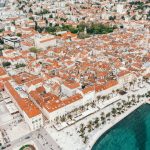Former Finance Minister Slavko Linić supports the possible arrival of the Russian oil company in Croatia.
Former Croatian Finance Minister Slavko Linić said on Thursday that it would be the best solution for Rosneft to buy MOL’s share in INA, the Croatian national oil company. “We know that MOL does not have serious intention to invest in the two refineries and it is not investing much in the Adriatic Sea resources as well,” said Linić, reports N1 on November 2, 2017.
“At the same time, we hear rumours about Rosneft and MOL, which means they have already been in contact and that the negotiations have progressed a lot. They will agree to transfer MOL’s shares in INA to Rosneft,” said Linić.
Talking about last year’s announcement made by Prime Minister Andrej Plenković that Croatia would buy back INA from MOL, he said that it was a message about dissatisfaction with the partnership with MOL. “This announcement was a message that they were dissatisfied with MOL as a partner. All these arbitration proceedings at global tribunals indicate that it is time to move on. I believe the Croatian side was unable to negotiate with MOL because it would be blackmailed, and Croatia does not have enough money to invest by itself,” he said and added that Croatia could get more gas, oil and better prices with Rosneft.
“The Russians are not interested in the Croatian market, but in the Mediterranean. They will come with their own oil and gas and produce their derivatives here. Their interests will fall in line with Croatian interests. MOL is an enemy which has conquered the market and destroyed INA. We need to change that, and the Russians will change it,” Linić said.
The former Minister said he was against the construction of a floating LNG terminal on the island of Krk. “I am against the floating terminal which is advocated by the Americans. There will be no jobs here for Croatian construction industry and equipment, which will be imported from abroad. On the other hand, it is ecologically less favourable than a land-based alternative,” Linić said.
Turning back to INA, Linić added that the key problem was the management of INA by MOL. “It is important to learn a lesson, and the lesson is that MOL now has exclusive rights to manage INA, while the Croatian side has no authority. That is the responsibility of the government led by Ivo Sanader, which signed these contracts. If Russians enter INA, we have to change the contracts. The biggest benefit from the Russian side will be the return of the oil fields in Syria,” said the former SDP’s minister.
Translated from N1.








